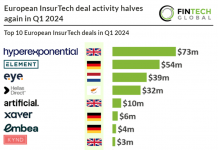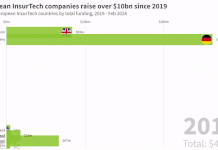UK challenger bank Tide has frozen the issuing of Bounce Back Loans for small businesses after its funding efforts fell through, leaving customers crestfallen and in tears.
Back in June, Tide announced that it had applied to be part of the British government’s Bounce Back Loan Scheme, loans aimed at providing businesses with a financial lifeboat through the Covid-19 crisis. The government guaranteed that lenders would be reimbursed if the loanholders were unable to pay back the money lent to them as part of the scheme. Importantly though, the lenders would have to fund the loans themselves, which is where the neobank has faltered.
Despite working “many evenings and weekends” to secure the funding, CEO Oliver Prill has announced that it has been unable to secure funding for the loans. As a result, it has now stopped issuing the loans.
“We felt it was our responsibility to let you know as soon as we learned this news and that we’ve had to make the difficult decision to pause lending and close the waiting list,” he said.
Prill blamed Tide’s inability to raise the funds on the design of the governmental scheme, saying it didn’t “meet the requirements of our prospective funding partners to be able to provide the funding for us to lend to you.”
“The way the Bounce Back Loan Scheme is set up makes it very easy for banks with large pools of funding available, but not for FinTech companies like Tide,” he said.
Prill added that the company is in talks with the HM Treasury, hoping to convince the government to find a way to provide funding for “the scheme directly to lenders, rather than lenders sourcing capital from investors or other financial institutions.”
“As reported in the press, the government has been considering this for some time, and there are examples where the government is directly providing funding for the Coronavirus Business Support (for example, for the Future Fund),” the CEO continued.
“With the ‘whatever it takes’ approach the chancellor has taken to supporting the economy, we believe this is a good opportunity for the government to make changes that will significantly benefit our members and the UK economy overall.”
Prill also recognised that many customers were depending on Tide to come through with the loans. “Many of you have told us that you don’t have alternatives and that you’re depending on getting a Bounce Back Loan from Tide,” he said. “The vast majority of businesses on our waiting list have been existing members that count on Tide to support them.
“Our sense of responsibility towards you and our mission to do everything we can to support small businesses is what drove us to achieve accreditation as a Bounce Back Loan lender.”
That being said, Prill added that “we made it clear when registering on our waiting list that we couldn’t guarantee a Bounce Back Loan for every eligible business who registered and we suggested that you should sign up with alternative lenders as well”.
“We’re very sorry that on this occasion we couldn’t rise to this challenge and meet your expectations,” Prill said.
The news have left several users dejected. “Absolutely gutted about this,” one person tweeted.
Another one said, “What about all us [thousands that have] been waiting on [Tide?] I have sat and cried for the past hour I do not [know] what to do now! I bank with Tide and have for almost three years. I can not get access to help with any other bank.”
The user continued. “My life is over!!! I’ve worked and built up a business for three years, got two shops and a massive online platform that is now sinking along with [probably] my house and car and my childrens’ livelihood, please help us!!! A loan, don’t want any hands outs.”
While several users were left dispirited, others responded with anger. “After six weeks of bungling you have now pulled the scheme,” one said. “What a joke. You have failed miserably to communicate effectively throughout this process and failed to address the issues OF YOUR MAKING that meant I was unable to apply whenever the application window was open to me.”
Others accused Tide of knowingly misleading its customers. One said, “You lied. You mislead us. You failed us. Faze the closure of Tide and do the right thing. I’m taking my three accounts to another bank after supporting you from the start. You absolute deceitful lying organisation Ruining business who could of made different plans. Thanks for nothing.”
Others lambasted the British Business Bank for letting Tide join the scheme in the first place. “That’s nearly 20 years of *HARD* work completely wiped out. THERE ARE NO OTHER OPTIONS. You should never have accredited them. It was obvious no one would lend them money at such a low rate (except the BOE and Tide are not a bank). YOU have failed us too,” one person tweeted.
Tide is not the only neobank to have faced a backlash like this because of its handling of Bounce Back Loans.
In early May, Starling Bank declined about 2,900 business owners who had applied for a loan under the scheme in the first week of the challenger bank providing them. That represented roughly 16% of the applications.
Starling Bank founder Anne Boden announced that the prospective loan takers had been rejected because the company considered them insufficiently able to demonstrate that they would be able to pay back the loans.
Just like Tide, Starling Bank had to face a furore on social media when it announced its decision.
“[You] are like the ice cream man with his chimes on, only to find out he’s got no Mr Whippy to sell only ice pops but to get the ice pop you have to sing the National Anthem backwards. Then he tells you he’s ran out of ice pops,” one rejected business owner wrote on Twitter.
Tide was set up in 2016 with the stated mission to help entrepreneurs and small business owners “focus on building their businesses into something great, giving them back the time to do what they love.”
Since then the company has reportedly raised more than £70m in funding, most recently it raised £44.1m as part of its Series B funding round in October 2019.
Copyright © 2020 FinTech Global



![Flutterwave teams up with Acquired.com to streamline outward remittances in EU and UK Temenos (SIX: TEMN) today announced that National Bank of Iraq (NBI), part of the Capital Bank Group, has successfully gone live with Temenos core banking and payments. NBI, which has 27 branches across Iraq, offers a comprehensive range of services to individuals and businesses in the country. Since 2005, NBI has been majority owned by Capital Bank, one of the top financial institutions operating in the Jordanian and regional markets, with assets of approximately JOD 7.6 billion[1]. With this implementation, NBI moved from its legacy systems onto the same core banking platform as other entities in the Capital Bank Group. This will enable NBI to operate more efficiently and integrate seamlessly with other systems to develop new products faster and deliver an improved customer experience. Capital Bank Group is a long-standing Temenos customer with other entities in the Group including Capital Bank of Jordan, Bank Audi, Société Générale Bank Jordan and NBI Saudi Arabia, already on the Temenos platform. NBI also becomes the first part of the group to adopt Temenos Payments, which enabled the bank to process more than 100,000 transactions of incoming and outgoing domestic and international payments in the first 15 days of operation, with a 99% straight-through processing rate. The migration to the Temenos platform for core banking and payments at NBI was completed in under 12 months thanks to Temenos’ pre-configured banking and payments capabilities and APIs which reduced the need for complex customizations, as well as close collaboration between Temenos, NBI, Capital Bank and delivery partner ITSS. This success was recently recognized in the IBS Intelligence Innovation Awards, with Capital Bank winning ‘Best Implementation of Core Banking Services'. The implementation at NBI follows several other successful transformation projects with Temenos for Capital Bank in the last few years, including the launch of NBI’s branch operations in Saudi Arabia in just 45 days, as well as the integration of Bank Audi and the former Jordanian operations of Société Générale, each of which was achieved in under four months. Collectively, these projects helped Capital Bank to increase operational efficiency by more than 50% within three years, bringing significant cost savings and an improved customer experience. With faster, more accurate processing and immediate service requests, the bank has maintained high customer retention rates and a reputation for service excellence. Izzidin Abusalameh, Chief Operations Officer, Capital Bank Group, commented: “This achievement marks a significant milestone in our digital transformation journey and positions us as a leading player in the banking industry. We have seamlessly transitioned the National Bank of Iraq to a cutting-edge core banking system which will not only enhance operational efficiency but also support providing our customers with a superior digital banking experience. Our continued partnership with Temenos has not only provided us with an advanced technological platform but has also facilitated a culture of flexibility and adaptability, enabling us to execute our ambitious growth plans.” Lee Allcorn, Managing Director, Middle East & Africa, Temenos, said: “Congratulations to National Bank of Iraq and the Capital Bank team on this successful implementation that gives NBI business agility and the same modern technology platform and ability to deploy fast with pre-configured banking capabilities as the rest of the group. With Temenos, Capital Bank Group is future-ready, and we are proud to support them as they continue to innovate and leverage our platform to grow sustainably and enhance the banking experience for customers.”](https://fintech.global/wp-content/uploads/2024/04/rupixen-Q59HmzK38eQ-unsplash-2-218x150.jpg)







